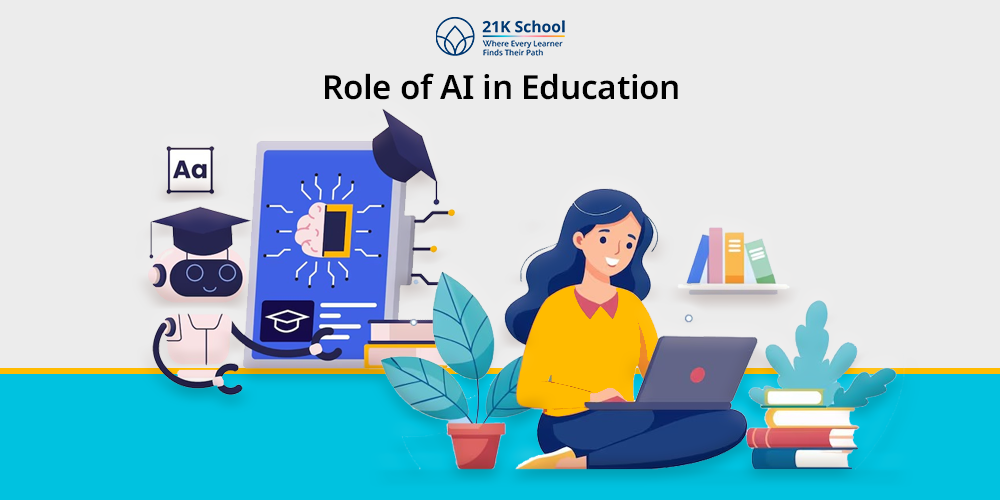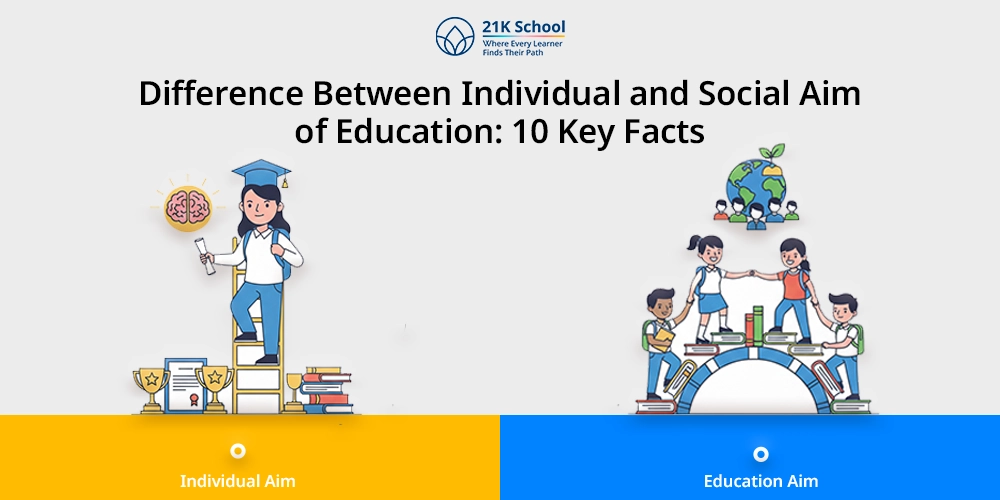
Artificial intelligence or AI is something that we hear on every second day. But how is it working in the education sector?
Artificial intelligence tends to replicate human intelligence behaviour and works by understanding the different patterns and data. While it was developed many years before, it has gained popularity in different fields recently.
Artificial Intelligence (AI) uses self intelligence of commands in order to perform any task on its own. In today’s 21st century AI is used in every technology enhancing the learning experience of users.
AI is known for its flexibility and making learning more simpler, due to which it is widely used in the education sector. Implementation of AI into education has changed the traditional schooling method making education more engaging and easy for students and teachers.
AI will enhance the learning outcomes of students by meeting the individual needs of the students. AI provides personalised learning , automates the task and provides various tools and resources in order to making learning simpler.
What is the Role of AI in Education?
AI has made education more accessible and simpler in terms of feedback, accessibility, personalisation and so on. AI allows children to complete their homework, clear their doubts, and make learning more impactful.
Through AI in education, children can get quick feedback regarding their performance, simplification of complex topics, equity in education and so on. AI also helps teachers to save their time and workload making it easier for them to focus on the facilitation only.
With the help of AI children can also automating their tasks which also allows them to focus on some extracurricular activities . The followings are the role of AI in education
1. Personalised Learning
Artificial intelligence provides personalised education to students enable them to study as per their comfortability and convenience. The personalisation of education allows children to understand their weaknesses and strengths.
AI uses every students data in order to provide them with the customised tailored content meeting the different needs of every students. Through personalisation techniques children are better able to perform in their examination.
2. Task Automation
AI is known for automation of its work, AI makes every task automated, which helps in saving the time of students and teachers.
Through AI teachers can automate their works such as giving assignments, taking exams, checking assignments and so on. Using various AI enabled tools helps in creating class timetable and allocate class resources equally.
3. Better Engagement
AI is typically used in education to make a class more interactive and engaging. 3d simulations, interactive designs are used for better understanding and fun learning for the students.
The AI makes education much more reachable to the students such that they can study anytime and anywhere. The students also get a quick response of their performance through AI that draws out the strength and weakness.
4. Quick Feedback
AI provides quick feedback to students on their performance by accessing their strength and weaknesses. Using AI in education helps teachers to carry live assessment with the help of formative assessment tools .
This lets the educators to quickly understand the needs of students and this also identified their weak points.
5. Adaptable Nature
Artificial Intelligence are known to be adaptive which means it can be adapted to any learning environment. There were various AI tools that were adapted for educational assessment making it accessible for every one.
The AI systems are known to be adapted to learn according through the lesson plans or according their needs. This technique helps students to get customised education and enables them to develop self-confidence and focus.
6. 24/7 Access
Implementing AI into education provides the benefits of 24/ 7 access, which means students can clear their doubts, study and appear for exams at any time from anywhere.
This flexible learning opportunity enable children to study by their own without having any limitations. Unlike traditional schooling method which focuses on structured learning methods , integrating AI allows students to study as per their own study routine .
7. Intelligent Tutoring
AI provides intelligent tutoring, can be used to assess a student’s overall performance and then on the basis of the trail records and data, can quickly feedback. AI tutoring enables a quick guide on how to improve the performance.
The artificial intelligence system in education helps to students in rapid feedback that also guides students on how to improve the performance. Integration helps to enhance the learning outcome of the students by closing the gap between theoretical and practical knowledge .
8. Education of Special Needs Students
AI can be also seen as promoting an inclusive learning environment enabling every students to study without any limitations. AI provides special needs students with extra support and learning material to comprehend any information.
Through this special need students can study as per their own comfortability and learning pace without having any difficulties. AI automates most of the tasks and makes learning more fun which is highly beneficial for special need students.
9. Language Learning
AI in education focuses on providing educational experential with integration of technology in education. Through AI, language learning becomes very easy, based on that students can easily learn languages.
Even various AI platforms also provides multilingual supports which means it gives access to a number of languages and resources. This enable students to receive the core concepts in their regional language, irrespective of any barriers.
10. Augmented Reality (AR) and Virtual Reality (VR)
Augmented Reality and Virtual Reality are two popular methods based on simulation, this uses 3D simulations for making educational content more engaging.
AR and VR help students grasp difficult concepts, making it easier for them to make relation between real world and theoretical knowledge. AI in AR and VR helps in enhancing the learning efficiency of students making it easier for students to relate with the learnt knowledge
Benefits of AI in Education
Implementing AI into education helps in simplifying the tasks and makes education and work productive. AI is very beneficial in terms of offering personalised learning benefits , making it easier for students to rate with the course content.
Through AI teachers can automate their most of the task, which saves their time, through which they can only focus on teaching childrens. Here you can check some other benefits of AI in education .
1. Reduce Stress and Anxiety
AI in education is noted for reducing stress among childrens and teachers by distributing the workload. Through 24 hour access to educational content and personalisation enables students to study whenever they want.
Through this, they can allocate their time more effectively and prepare for the examination without having any exam stress .
2. Increases Accessibility
Education with AI increases the accessibility of education to every students making sure that every children get equal learning opportunities.
AI uses various tools such as adaptive learning materials, resources, visual elements and virtual learning platforms , which allows childrens to complete their education without any challenges.
3. Reduces Work Pressure
Task automation benefits the students as well as the teachers to save time and mainly reduce the workload. The students and teachers can check assignments, take exams, analysis the students’ performance, etc.
The AI takes a more significant part in checking the assignment, exams and in providing the feedback so that the teachers can focus on different aspects of learning.
4. Boost Teaching Efficiency
Adding AI in education helps teachers to become more effective. AI contributes to automation of most of the work of the teachers.
AI helps to schedule the daily routine of the class, check assignments and conduct tests, provide notes and other visual representation, which saves most of the time and work of the educators.
Better efficiency helps teachers to teach and complete the syllabus faster and better.
5. Promotes Virtual Education
AI provides virtual education in the form of video lessons or audio lessons. With the help of virtual education students can easily complete their studies from any geographical location irrespective of any barriers.
Various AI platforms provide digital classes in which automatic system conducts the classes. Through virtual education , student can clear their doubts and study at any time as per their study routine.
Conclusion
Those days are gone when the educational system used to follow traditional methods in the form of boring lectures experienced by the students.
The AI replaces the tutors and the learning process becomes so much more fun and appealing.
AI is all about using the power of advancements made in technology in order to improve the learning of the students and the efficiency of the tutors. The paths of learning get personalised to the students and the administrative work of the tutors get automated.
Special child requirements, language learning, complex subjects made simpler, more artistic, expanded through AR and VR.
There are worries about AI replacing teachers, but AI can be the teachers’ perfect partner and not replacement instead, teachers can shift to more teaching-based activities.

